BIG STORY
Labour Demands Reversal Amid Fuel Price Hike, Set To Meet
Published
3 months agoon
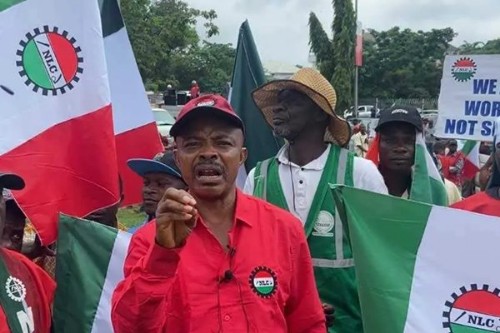
Following the official launch of Premium Motor Spirit (PMS) production at the Dangote Petroleum Refinery, oil marketers are eagerly awaiting the announcement of the fuel’s price.
The $20 billion refinery, located in Lagos’ Lekki Free Trade Zone, commenced petrol production with a 650,000-barrels-per-day capacity.
However, the Independent Petroleum Marketers Association of Nigeria (IPMAN) revealed that its members have yet to receive pricing information from the refinery.
Alhaji Aliko Dangote, President of Dangote Group, confirmed the refinery’s production start.
The price announcement will significantly impact Nigeria’s fuel market, influencing: competition among oil marketers, fuel affordability for consumers, local production versus importation dynamics.
“We have not received any notice about its PMS price because he categorically stated that the NNPC is the sole off-taker of the product, which to us came as a surprise,” National Publicity Secretary of IPMAN, Ukadike Chinedu, stated.
He added, “We had expected Dangote to open up the market for proper competition. This shows that all these while the NNPC has been waiting for Dangote to release products, as it had reduced PMS importation.
“However, we are still waiting for them to tell us the price, but this, of course, will have its effect on the pricing of the product considering the fact that the cost of the commodity has increased at NNPC retail stations.”
There are strong indications that the price of petrol may hit N1,200/litre following the decision of NNPC to raise the pump price at its stations on Tuesday.
This is even as the Dangote oil refinery announced its determination to supply 25 million litres of PMS daily in September.
Nigerians woke up on Tuesday to see a change in the pump prices, from around N600 to N855/litre, M918/litre and above, depending on the area of purchase at NNPC stations nationwide.
Repot also had it that there was a directive to the retail outlets to increase petrol prices.
It was gathered that the recommended petrol prices vary by location, as some now sell at N900.
It was confirmed on Tuesday that NNPC outlets in Lagos increased their price to N855/litre.
The directive to raise petrol prices stated that the NNPC Retail Management approved an upward review.
This is coming barely two days after the company admitted it was having challenges to import fuel due to a $6bn debt.
However, the spokesperson of the NNPC, Olufemi Soneye, declined comments when contacted him.
When told (by The Punch) that the statement had been making the rounds on WhatsApp and reports from NNPC filling stations showed a rise in fuel prices, he replied, “Thank you for reaching out. I have no comment on the matter at this time. If there are any updates, I will make sure to inform you.”
It was gathered from depot operators that N250 has been added to the pump price.
It was observed that some major marketers have also jerked up their pump prices close to 900/litre.
The North West filling station in Onigbongbo, Lagos sold at N920 while Amuf in Ibafo, Ogun State sold for N1,000 per litre.
It was observed that the sudden price rise caused tension among motorists, who rushed to filling stations to engage in panic buying.
In Lagos, the few stations selling petrol had long queues, leading to traffic gridlocks in different locations.
It was also observed that many filling stations did not open for business while many marketers refused to lift fuel.
An official of a petroleum company at Apapa confirmed to our correspondent that no marketer was in their depot to load petrol as of 2pm on Tuesday.
This he described as unusual, saying many marketers may not be able to afford the new price.
Before now, NNPC used to sell petrol to major marketers below N600/litre, while the independent marketers bought from private depots for about N900.
While there are fears that the private depots may face tougher challenges with this new price, black marketers sold the rpouct at N2,000/litre on Tuesday in Lagos.
Some black marketers, who spoke with one of our correspondents at Victoria Island, Lagos, offered to sell five litres of petrol at N15,000. During price negotiation, they rejected N8,000, insisting that the least the five litres could go was N10,000.
- 25 Million Litres
The Nigerian Midstream and Downstream Petroleum Regulatory Authority disclosed on Tuesday that the Dangote oil refinery will supply a total of 25 million litres of petrol to the Nigerian market daily in September.
The NMDPRA said this will rise to 30 million litres from October.
In a short statement, the NMDPRA said it met with the NNPC to agree on local crude supply to the refinery.
“At the NMDPRA headquarters in Abuja, NNPCL reached an agreement to commence crude oil sale and supply to Dangote Refinery in local currency.
“The refinery is now poised to supply an initial 25 million litres of PMS into the domestic market this September. And will subsequently increase this amount to 30 million litres daily from October 2024,” the NMDPRA said on its X.
The PUNCH reports that the President of the Dangote Group, Alhaji Aliko Dangote, formally announced on Tuesday that the 650,000-capacity oil refinery had commenced petrol production.
Dangote, who spoke at the refinery, said the supply of petrol to Nigeria would change the country’s energy landscape.
While appreciating President Bola Tinubu for approving the sale of crude in naira to local refineries, Dangote said many did not believe that the $20bn refinery could start petrol production.
He said the capacity of the refinery would meet local demands and the demands of sub-Saharan Africa.
Dangote disclosed that the petrol would get to filling stations in 48 hours after all arrangements with the NNPC were concluded, saying the queues would soon be over.
“Our PMS can be in filling stations within the next 48 hours depending on NNPCL,” he said.
“We are ready, and I want to appreciate President Bola Tinubu for making to achieve this monumental feat.
“I pray that within the next few days, you won’t see any petroleum queues as soon as we finalise with NNPC. We are ready x we are waiting for them and I hope they will be ready like yesterday.”
Dangote told newsmen that he would not be able to disclose the price of the product, saying the NNPC was in a position to control the price.
“On the pricing, I can’t say anything because we don’t control the pricing; the pricing, at the moment, is controlled by NNPC, not Dangote. We will wait for them. But our own for now is to make sure that the product is available and round-tripping is stopped.
“People are just taking dollars out and not bringing the product. Most of the shenanigans will stop, that’s what I can guarantee you,” he stated.
Dangote emphasised that NNPC was the company that would sell and distribute the product under the current naira crude sale arrangement.
“Once the NNPC is ready, we roll. We are even ready to load a ship this week,” he added.
He said Tinubu would deal ruthlessly with anyone who tried to stop the order that crude be supplied to local refineries.
Speaking further, the business mogul said the petrol and diesel from his refinery were clearer because they were of Euro 5 standard.
He said the fuel would have less emissions, saying it is good for the people’s health and engines.
“This is the sample of the petrol. You see it as a different colour, but that is the real deal. You are now going to have a good and genuine product. I am sure Nigerians have not seen this colour of diesel before. This is called Euro 5 diesel. It contains less than 10 parts per million of sulphur. This will help vehicles, engines, and generators last longer.
“The health of the people and the environment will not be compromised. This is the real deal,” he stated.
He also added that the Federal Executive Council was working on a new pricing arrangement for petrol produced from the Dangote Refinery.
“It is an arrangement which is designed and approved by the Federal Executive Council led by His Excellency, President Bola Ahmed Tinubu.
“As soon as it is finalised, which he (Tinubu) is pushing, once we finish with NNPC, it can be today, it can be tomorrow, we are ready to roll into the market,” he said.
Dangote explained why the first sample of petrol from his refinery appears clearer than the petrol currently in circulation.
“This is the sample of the petrol. You see it as a different colour, but that is the real deal. You are now going to have a good and genuine product,” he said
- OPS Predicts Inflation
Meanwhile, the Organised Private Sector said the hike in petrol price, which signalled the removal of subsidy on the commodity, would lead to another round of inflation nationwide.
Following the sudden increase in petrol prices, NNPC stations adjusted their pump prices from N750 to N950/litre while independent marketers sold fuel for between N1,400 and N1,500/litre in Kano.
Motorists in Sokoto and Kebbi states expressed shock after NNPC stations adjusted the price of a litre of petrol from N620 to N900 in both states.
A motorist, Shehu Salman, said “Honestly, this government has really shown its hatred for the masses. How can they increase the price of petrol at this period, when citizens are finding it hard to feed themselves?”
In Yola, the Adamawa capital, NNPC stations sold a litre for N1,000, with other stations selling between N1,200 and N1,300/litre.
In Maiduguri, NNPC sold at N897, others dispensed at N1,100.
Following the news of NNPC increasing fuel pump prices nationwide, Katsina State NNPC mega stations sold at N902/litre, which sold for N665 on Monday.
The NNPC fuel stations in Ilorin, the Kwara State capital, closed hurriedly following news of the increase in fuel price.
Two of the NNPC stations at Odota and Asa Dam road, which were selling fuel to early on Tuesday, reportedly closed and told vehicles on the queue to go out of the stations after learning of the new fuel price.
However, some independent marketers sold the product for N1,100 and N1,200/litre.
Most filing stations in Ibadan, the Oyo State capital, on Tuesday adjusted upward the pump price of petrol, with independent marketers dispensing the product at N1,000 and N1,100/litre, with long vehicular queues.
An attendant at one of the NNPC substations said, “We have not received any directive that we should start selling fuel above N580 per litre.”
NNPC substations on Tuesday implemented the new pump price of N865 per litre in Ogun State.
One of our correspondents learnt that independent marketers adjusted their pump price from N850 to N980 and above.
On Tuesday in Rivers, NNPC mega stations dispensed N509/litre, while other filling stations in the state sold at N1,100.
In Edo State, the NNPC station on Sapele Road increased their pump prize from N591 to N881/litre, but had no product to sell to motorists who besieged the station.
However, other petrol stations sold the product for between N970 and N1,000/litre. In Bayelsa, NNPC sold the product for N890/litre, while prices of others ranged from N990 to N1200, which triggered an increase in transport fares in Yenagoa, the capital city.
In Asaba, the Delta State capital, NNPC mega station along Asaba-Benin road sold fuel for N850/litre, while ther filling stations dispensed for between N950 and N1,100/litre.
NNPC stations sold at N850/litre in Imo State, while other independent marketers sold at N999.
“The removal of subsidies is expected to lead to an increase in petrol prices, causing higher costs for consumers and businesses that rely on fuel. This could contribute to higher inflation,” the President of the Nigerian Association of Chambers of Commerce, Industry, Mines, and Agriculture, Dele Oye, said.
He added, “Higher fuel prices may put a strain on household budgets, especially for lower-income families who spend a larger portion of their income on transportation and essential goods.
“Businesses may need to pass on some of the increased fuel costs to customers, which could impact the prices of goods and services. The government has said that targeted cash transfers or other support measures may be introduced to help mitigate the impact on the most vulnerable populations.
“Ultimately, the full economic and social effects will depend on factors like the magnitude of the price increase, the government’s response, and how consumers and businesses adapt. We advise the government to avoid another increase, as the average Nigerian is already overburdened by the effect of currency devaluation and fluctuations, which has resulted in hyperinflation.”
Also, the Nigerian Association of Small-Scale Industrialists decried the inconsistency in policy over subsidy removal on petrol.
The National Vice President of the Nigerian Association of Small-Scale Industrialists, Segun Kuti-George, said the Federal Government’s earlier position on subsidy removal was different from the recent developments leading up to a possible fuel price hike.
“I’m not sure where the idea of subsidy is coming from again. I’m saying this because I thought that we had removed the subsidy. There is a great deal of inconsistency there,” Kuti-George asserted.
“In the very first minute of this government, they said subsidy is gone. So what subsidy are we talking about now?”
Kuti-George noted that the Federal Government’s failure to officially announce a return of oil subsidy through back channels has made it hard to properly assess the impact of the removal of the subsidy.
“They did not tell us that the subsidy had returned through the back door. The last thing we had was the subsidy was gone. So how and when did the subsidy come back? That’s the idea. Let us now leave all this and say, okay, the subsidy is now just going. It is now just going,” he added.
Kuti-George said a possible hike in fuel prices would mean harder times for people and businesses.
He decried the progression in PMS prices, as he noted that “a litre went for N950 in the previous day and since the NNPC recently announced a selling price of N885, it will amount to over N300, (higher than) what they were selling before.”
“We should be expecting something from between N1,300 and between N1,100 and N1,500 per litre,” the NASSI Vice President added.
According to The Punch, the Director-General of the Nigeria Employers’ Consultative Association (NECA), Adewale-Smatt Oyerinde, said, “The new pump price of petrol is not only worrisome but also unfair.
“We had expected that the Government will leverage on the momentum created by the completion of the Dangote refinery and the planned commencement of operation of the Port-Harcourt refinery to clear the obvious self-inflicted pain on Nigerians and progressively reduce the pump price of petrol. This seems not to be the case.”
According to Oyerinde, the new pump price could be seen as making Nigerians pay for the crass inefficiency in the NNPC.
“Rather than address the fundamentals that have made Nigeria a net importer of petrol, even when we have four refineries, the Government continues to inflict pain on Nigerians and inadvertently, contributing to the increase in cost of doing business,” Oyerinde mentioned.
“We urge that Government should have a rethink and do all that is necessary to address the continuous impoverishment of Nigerians and incapacitation of organized businesses,” the NECA boss stated.
Credit: The Punch
You may like
-
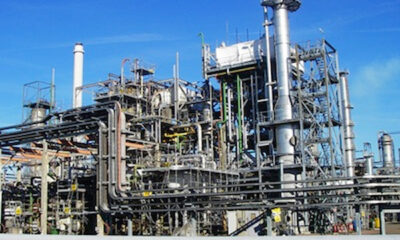

Port Harcourt Refinery Halts Operations Over Calibration, Loading Bay Empty
-


Simon Ekpa To Spend Christmas In Detention As Finland Court Denies Him Bail
-


Abuja Herbalist Hospitalised After Shooting Self While Testing ‘Bulletproof’ Charm
-


Hon. Abimboye Celebrates Governor Adeleke’s 2nd Anniversary With Food And Cash Gifts In Ode Omu
-


Appeal Court Nullifies Rape Conviction Of Lagos Doctor Femi Olaleye
-
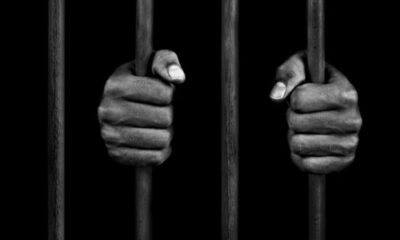

US-Based Nigerian May Get 20-Year Jail Term Over Money Laundry
BIG STORY
Port Harcourt Refinery Halts Operations Over Calibration, Loading Bay Empty
Published
17 hours agoon
November 30, 2024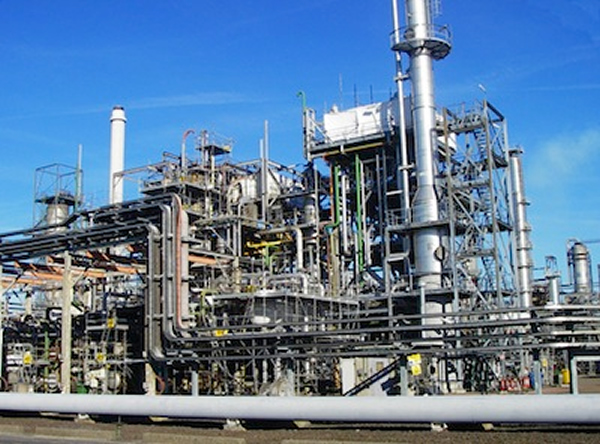
The fanfare and cheers that greeted the resumption of activities at the Port Harcourt Refining Company on Tuesday may have faded, leaving the hopes and expectations of many Nigerians uncertain.
A visit (by Saturday Punch) to the refinery on Friday revealed that there was no activity on-site, with some workers stating that the refinery was undergoing calibration, which might last until next week.
The Port Harcourt Refinery has faced numerous delays and missed deadlines for resuming operations.
However, on Tuesday, the Group Chief Executive Officer of the Nigeria National Petroleum Company Limited, Melee Kyari, inaugurated the new plant at the Area 5 terminal of the refinery. It was claimed that 200 petrol trucks were loading daily from the plant.
Despite the announcement, skepticism arose as reports circulated that the trucks were being loaded with old products from the storage tanks.
Upon visiting the Port Harcourt Refinery Area 5, it was observed that there were no signs of activity.
An official, who spoke on condition of anonymity, revealed that the loaded trucks contained “dead stock.”
He said, “Before the refinery was shut down between 2015/2016, we had dead stock left in the tank, including some Premium Motor Spirit (petrol) DPK (kerosene), and Automated Gas Oil (diesel).
“So, these products were in large quantities in stores in those tanks. During the rehabilitation of the Port Harcourt Refinery, Old Area 5, those products were evacuated from the tanks for storage.”
However, he noted that the large quantity of refined petrol was “off-spec,” requiring separation from water to obtain the main product in preferred colours.
“But for DPK, it is in large quantity but they have not pushed it from the tank where it was kept after refined ready for commercial purposes.
“So, the product that was loaded was dead stock, that is the old product that was in the system. So, after these dead stocks, they will have to clean the tank, remove all the debris before pumping the new project into that tank, and redye it,” the source said.
The worker highlighted that refineries worldwide should operate electronically, not manually.
“But what they are trying to do at the Port Harcourt Refinery is manual, which cannot match the new digital pumps. Most of the pumps used for the event were refurbished,” he added.
He explained that during Kyari’s visit on Tuesday, seven trucks were prepared for loading, but only five were filled with petrol.
The Chairman of the Independent Petroleum Marketers Association of Nigeria, Taken Ikpaki, while speaking to journalists during the inauguration of the facility on Tuesday, had expressed optimism.
He stated that more trucks were expected to come into the facility to load products in the coming days.
But rather than more trucks coming into the refinery, the number of trucks has dwindled.
Around 1.30pm when our correspondent visited, he observed that most workers and drivers appeared idle as no machinery was operational.
Nine trucks were seen parked, but the loading bay, numbered from one to 18, was empty and deserted, with some workers lying down.
When asked about the lack of loading activity, a worker in overalls said, “They are de-watering, removing the water under the PMS. Maybe there will be loading after that, but we don’t know what time today.”
Another worker at the loading bay mentioned that ongoing calibration was the reason for the delay.
“They are calibrating the meters,” he said tersely.
Findings (by Saturday Punch) showed that the PMS left in the storage might not be enough to fill five trucks.
A source indicated that calibration would continue until Monday, with the loading of DPK (kerosene) and AGO (diesel) expected to start by then.
Speaking to our correspondent, a resident of Alode in Eleme Local Government Area of Rivers State, who simply identified himself as Osaro, said, “After that ceremony with Mele Kyari where they said the refinery had started operation and loading was taking place, what happened afterwards? They continued loading on air, that is on the pages of newspapers and social media.”
When contacted for his reaction on the lack of activities on Friday, the National Public Relations Officer of the Petroleum Product Retail Outlet Owners Association of Nigeria, Dr Joseph Obelle, said it was as a result of ongoing calibration.
Obelle, the PETROAN spokesman, said, “They are calibrating the loading pumps. They will be done today.”
Meanwhile, it was gathered that the Senate Committee on Petroleum visited the refinery on Thursday on a facility tour. The outcome of the visit had yet to be made public.
Calls and text messages to the spokesperson for the NNPC, Olufemi Soneye, were not replied as of the time of filing this report.
But the NNPC had in a statement denied claims by an Alesa community leader, Timothy Mgbere, that the Port Harcourt refinery was not producing fuel.
Soneye accused Mgbere of crass ignorance of how a refinery runs.
He said, “The old and new Port Harcourt refineries have since been integrated with one single terminal for product load-out. They share common utilities like power and storage tanks. This means that storage tanks and loading gantry which he claimed belongs to the new Port-Harcourt Refinery can also receive products from the Old Port Harcourt Refinery.”
He called on the public to disregard claims borne out of “sheer mischief and blatant display of ignorance.”
Credit: The Punch
BIG STORY
Simon Ekpa To Spend Christmas In Detention As Finland Court Denies Him Bail
Published
17 hours agoon
November 30, 2024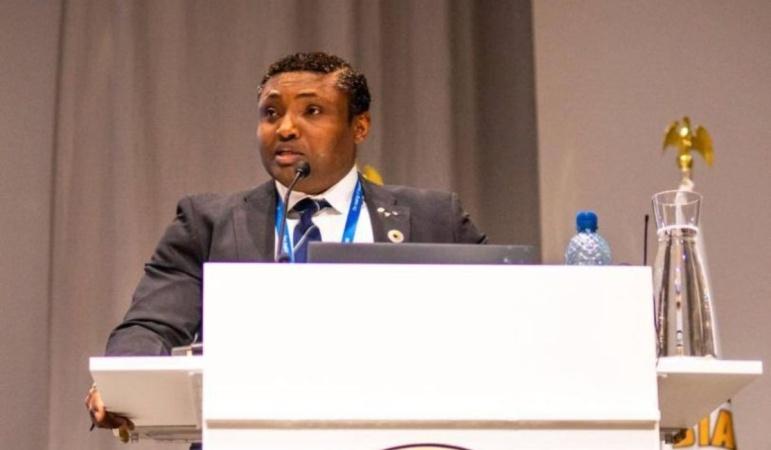
- Followers declare United States of Biafra in Finland
Pro-Biafran agitator Simon Ekpa, who was arrested in Finland for alleged terrorism-related activities, will spend Christmas in detention, as Finland’s legal system does not allow for bail.
Mikko Laaksonen, a Senior Detective Superintendent at Finland’s National Bureau of Investigation, confirmed this (to Saturday Punch) in an email.
The news comes as Ekpa’s supporters declared the establishment of the United States of Biafra during a conference held in Finland on Friday.
Last week, the Finnish government announced the arrest of Ekpa and four others on suspicion of terror-related offenses, including incitement to violence and terrorism financing.
Finnish police have confirmed that Ekpa, who calls himself the Prime Minister of the Biafra Republic Government-in-Exile, allegedly used social media to incite violence in the South-East region, targeting both civilians and authorities.
According to local publication Yle, Ekpa was remanded in custody by the Päijät-Häme District Court on charges of public incitement to commit a crime with terrorist intent.
The publication reported that the Finnish Central Criminal Police confirmed the arrest in a statement last Thursday, noting that other suspects were apprehended for allegedly financing terrorist activities.
Also, Ekpa is scheduled to face charges in May 2025, according to Finnish authorities.
When asked if Ekpa’s charges were bailable or if the prosecution was disposed to releasing him on bail, Laaksonen said, “Finnish criminal procedure/coercive measures do not recognise bail procedure.
“Our procedure is based on, depending on the case, remand or travel ban as coercive measures for limiting freedom of movement for persons suspected of offences to which such measures are applicable.”
- Supporters Declare Biafra
In Finland, Ekpa’s supporters converged on Lahti in Finland on Friday to declare the United States of Biafra.
A few days before the conference, videos circulated on social media showing a significant influx of Nigerians into Finland for the event tagged, ‘Biafra Mass Exodus 2024’.
An X user, @DOlewunne, tweeted, “Huge in Finland Under His Excellency the Prime Minister of Biafra Simon Ekpa (sic). The re-declaration of the Independent State of Biafra/United States of Biafra is in full swing. This historic independent moment is championed by the People of Biafra. We are a Nation! (sic).”
The convener of the convention, who introduced herself as the Chief of Staff of the United States of Biafra and the organiser of the Biafra Declaration of the Restoration of the United States of Biafra Convention 2024 in Finland, is Dr Ngozi Orabueze.
According to several online sources, Orabueze is a family nurse practitioner in Atlanta, Georgia, with expertise in treating diabetes, bipolar disorder, and depression, among other conditions.
She was first appointed by Ekpa in March 2023 as Minister of Health, Oil and Gas, Biafra Republic Government in Exile.
Orabueze, who has over 17,500 followers on X and more than 12,000 on Facebook, wrote on November 27 that the convention was to take place in Lahti, noting that it would kick off with a live X Space event.
On 28 November, she wrote, “Biafrans are trooping into Finland in droves ahead of the re-declaration of the independent state of Biafra,” attaching a video of a large Igbo-speaking crowd awaiting clearance at the Finnish airport.
On Friday afternoon, Orabueze posted on her verified X handle, @ngoziora, that Biafrans had declared an independent state and would now use their own currency (Biafra coins) and time (Biafra time), notifying the Nigerian government and the international community.
The declaration of Biafra’s independence, initially slated by Ekpa for December 2, faced some setbacks following Ekpa’s arrest and prosecution by the Finnish government.
Orabueze wrote, “Breaking: It is done. Biafrans in Finland for the declaration of the independent United States of Biafra. Power belongs to the people.” She later added, “Biafra has been re-declared today, 29th of November 2024, by Ngozi Orabueze, the Chief of Staff, United States of Biafra. Congratulations to all Biafrans all over the world.”
Before the declaration, a video of Ekpa addressing the audience was played online.
Ekpa stated, “We were free before Lord Lugard came. If you want the oil, take it and leave us alone. We are tired of living as baboons and monkeys. We want to be given the opportunity to practise what we have studied.”
As the video ended, the audience began to chant, “USB, USB, USB,” meaning the United States of Biafra.
Afterwards, Orabueze, taking the oath of office, listed the states within the newly re-declared United States of Biafra.
These included Anambra State, Okigwe State, Nnewi State, Ogoni State, Opobo State, Ikwerre State, Etche State, Okrika State, Ngwa State, Orlu State, among others. The crowd cheered her on in both Igbo and English.
After the declaration, the crowd sang an Igbo song, “Biafra aga’m arapu gi,” translating to “Biafra, I will never let you go.”
Earlier in videos and photos shared on X, several members of the group claimed they were just landing at the Finnish airport in Helsinki.
A woman, @Charedims, who took a video while on a flight, said, “Biafrans all over the world from different continents everywhere are converging on Lahti for the convention.
“On December 2, when all votes are counted and collated, a mandate will be given to our prime minister, Simon Ekpa Njoku, who is currently answering some questions with the Finnish authorities; when the votes are counted, he will then declare the restore of the independent state of Biafra, which means he has the legal rights to get us Biafra. That is why you are seeing everybody jumping up and down.”
- IPOB Disowns Group, MASSOB Denies Claim
Reacting to the development, IPOB’s spokesperson, Emma Powerful, rejected the notion that the group was behind the event.
He stated, “IPOB has no involvement in any conference. Those people (Ekpa’s faction) are criminals supporting illegal activities to destroy our land. There is no such thing as a declaration of Biafra from our side.
“Any claim that IPOB is hosting a conference is false. When IPOB decides to make such an important announcement, the whole world will know. Those making such statements are fake.”
The spokesperson for the Movement for Actualization of the Sovereign State of Biafra, Sunday Edeson, stated that if IPOB succeeded in the realisation of Biafra through its declaration, MASSOB would accept and rejoice with them.
He added that the British government would never support the freedom of Biafra.
“Everyone has the right to declare. They declared their freedom in Finland, but we know that we’re still under Nigerian leadership. We support them.
“Declaring independence in Finland doesn’t mean we’re free from the Nigerian government. We still use Nigerian currency, and security agencies are still from Nigeria. So, we’re still under Nigeria’s control,” Edeson said.
- Extradition
Meanwhile, a spokesperson for the Ministry of Foreign Affairs, Kimiebi Ebienfa, told Saturday PUNCH that Nigeria did not have an extradition agreement with Finland.
Also, Finland through the Finnish Embassy in Nigeria said it could not comment on the matter.
The Director of Defence Information, Brig Gen Tukur Gusau, had said Ekpa, a self-proclaimed disciple of IPOB leader, Nnamdi Kanu, should be extradited to Nigeria to face criminal charges.
Many Nigerians online also demanded his repatriation to Nigeria to face terrorism charges.
In response to the call for Ekpa’s extradition, a lawyer during ‘The Morning Show’ on AriseTV, Chukwuma Ezeala, said that Finnish-based Nigerian was charged with terrorism and countries involved must cooperate.
He stated that he could be tried in Nigeria or Finland.
“On the issue of extradition, for him to be extradited, there must be a bilateral agreement. From all indications, Nigeria doesn’t have a bilateral agreement with Finland.
“However, since it’s an international crime, he can still be extradited to Nigeria based on international conventions.
“The question will now be, can Nigeria satisfy conditions or requirements of extraditing a person to Nigeria without a bilateral relationship,” Ezeala queried.
Credit: The Punch
BIG STORY
Abuja Herbalist Hospitalised After Shooting Self While Testing ‘Bulletproof’ Charm
Published
17 hours agoon
November 30, 2024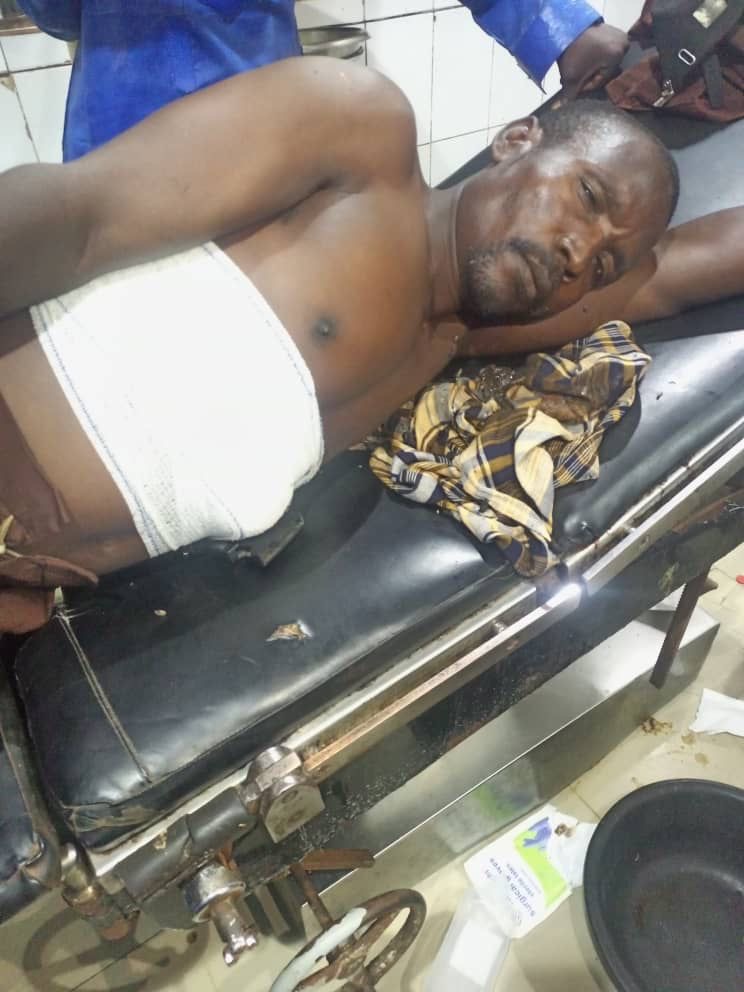
A herbalist, Ismail Usman, suffered a life-threatening injury while testing a self-made ‘bulletproof’ charm. The incident occurred in Kuchibuyi village, Federal Capital Territory, Abuja, on November 23.
Usman used a locally fabricated gun to shoot himself in the stomach after fortifying himself with the charm. Unfortunately, the charm failed, leaving him severely injured.
FCT police command spokesperson Josephine Adeh confirmed the incident, stating that officers from the Byazhin Division rushed Usman to Kubwa General Hospital. Due to the severity of his injuries, he was later transferred to Gwagwalada Specialist Hospital.
Adeh said, “A distress call from Shandam Michael reported a shocking event involving Ismail Usman, a local herbalist known for his unconventional methods. In a misguided attempt to test the effectiveness of a self-made ‘bulletproof’ charm, Usman shot himself in the stomach with a shotgun.
“Unfortunately, the charm failed to protect him, resulting in life-threatening injuries. Officers from the Byazhin Division responded swiftly, arriving at the scene to find Usman in critical condition. He was quickly transported to Kubwa General Hospital for emergency treatment and later transferred to Gwagwalada Specialist Hospital for further care.
“In the aftermath, police conducted a thorough search of Usman’s home, recovering the homemade gun and an array of charms used in his reckless experiment.”
Adeh stated that Usman would face charges for unlawful possession of firearms and attempted suicide, violating Section 231 of the Penal Code Law of Northern Nigeria.
She said, “Investigations are ongoing, and Usman is expected to face charges for unlawful possession of firearms and attempted suicide under Section 231 of the Penal Code Law of Northern Nigeria.
“Commissioner of Police FCT, CP Olatunji Disu, condemned the incident, highlighting the dangers associated with illegal firearms.”
Most Popular
-

 BIG STORY17 hours ago
BIG STORY17 hours agoAbuja Herbalist Hospitalised After Shooting Self While Testing ‘Bulletproof’ Charm
-

 BIG STORY5 days ago
BIG STORY5 days agoJUST IN: Ebonyi Governor Suspends Health, Housing Commissioners Over “Gross Misconduct, Negligence Of Duty”
-

 BIG STORY3 days ago
BIG STORY3 days agoPresident Tinubu To Name New Ambassadors After France, South-Africa Visits
-

 BIG STORY5 days ago
BIG STORY5 days agoJUST IN: Customs Hands Over 21 Stolen Vehicles To Canadian Government
-

 BIG STORY5 days ago
BIG STORY5 days agoBREAKING: Finally, Port Harcourt Refinery Begins Production
-

 BIG STORY4 days ago
BIG STORY4 days agoGovernor Abdulrazaq Commits To Hosting 2025 BON Awards, Makes History As First To Host Consecutive Editions [PHOTOS]
-

 BIG STORY5 days ago
BIG STORY5 days agoTwo US-Based Nigerians Bag 30-Year Jail For $3.5m Romance Scam
-

 BIG STORY2 days ago
BIG STORY2 days agoAppeal Court Nullifies Rape Conviction Of Lagos Doctor Femi Olaleye









